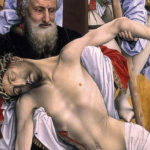
On a CBS news program, for Mother’s Day, 2014, the story was told of a family with something of a bizarre history. The father, a certified anthropologist, was researching a primitive tribe near the headwaters of the Orinoco River in South America. It required significant effort to get to the tribe, but the professor was tenacious for purpose, and proceeded with his appointed task, in an accepting spirit for the culture odd by nearly all standards of modern society. One of the young women, barely out of her childhood caught his attention. They synchronized well, and cared for each other. They were married, and he took his young bride to America when he returned home. She adapted, or appeared to… Read more






